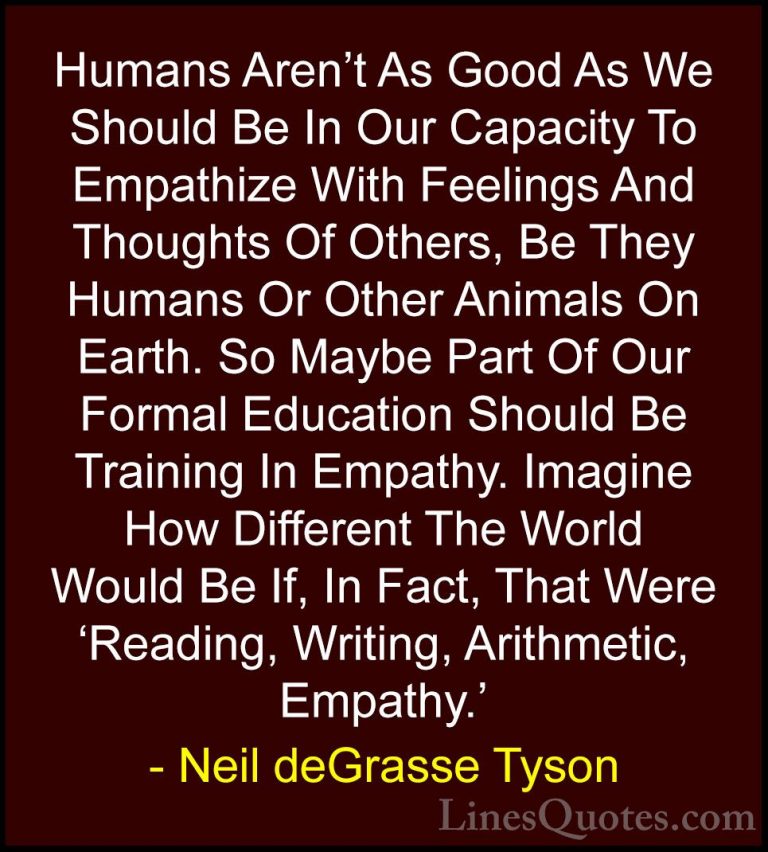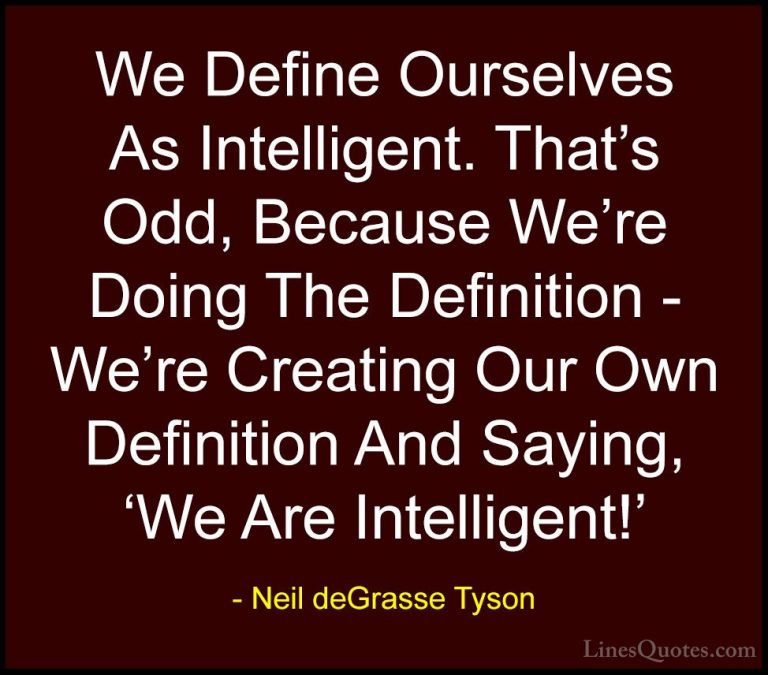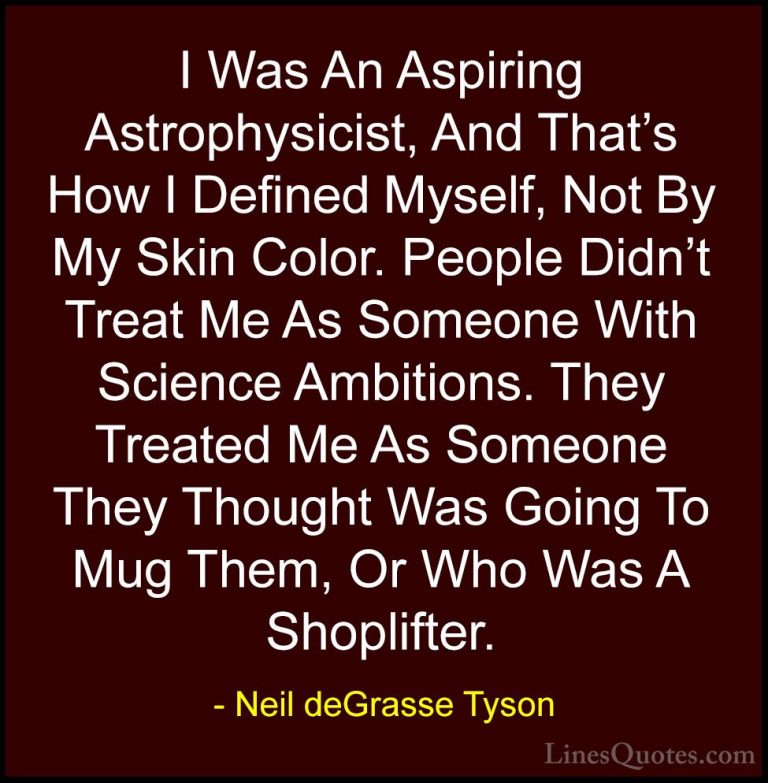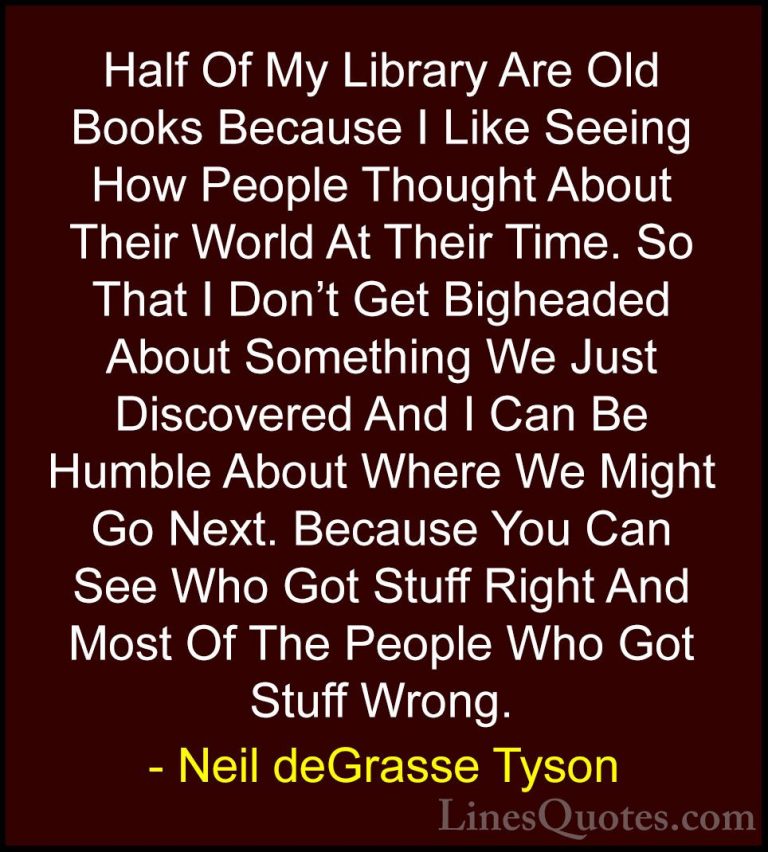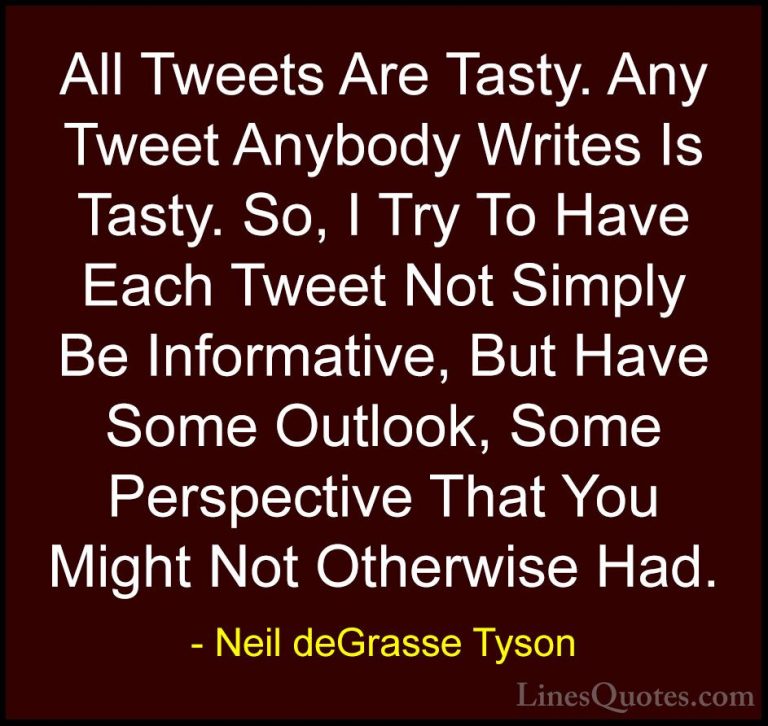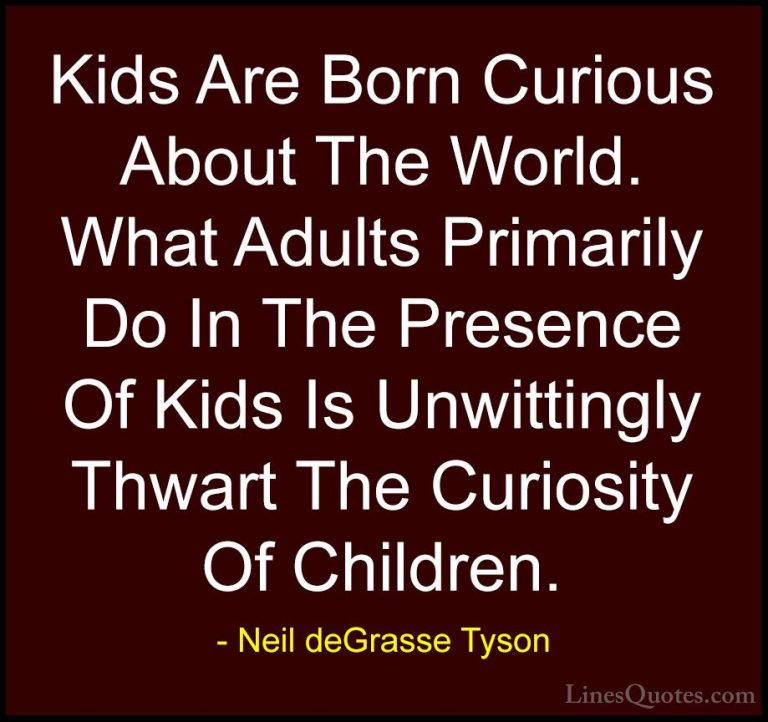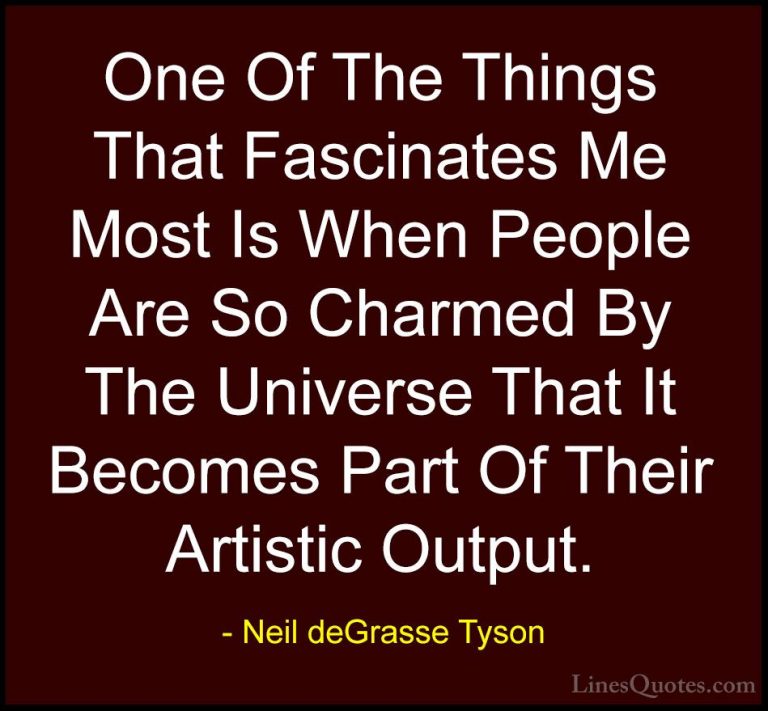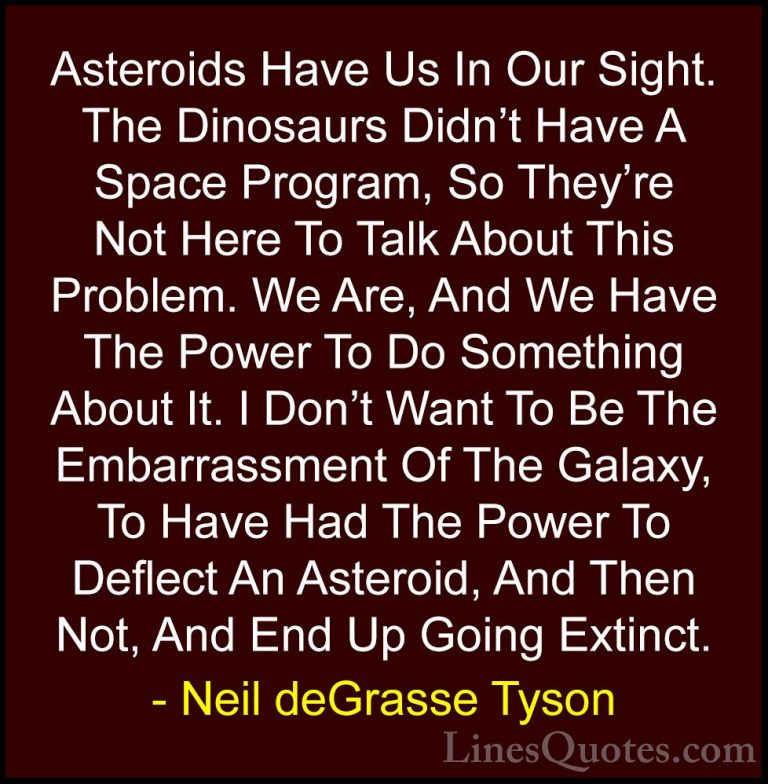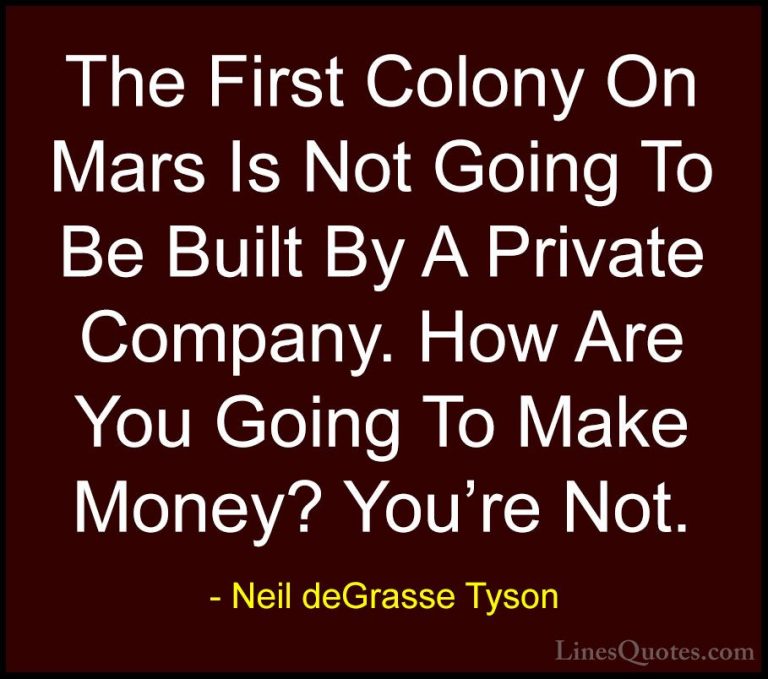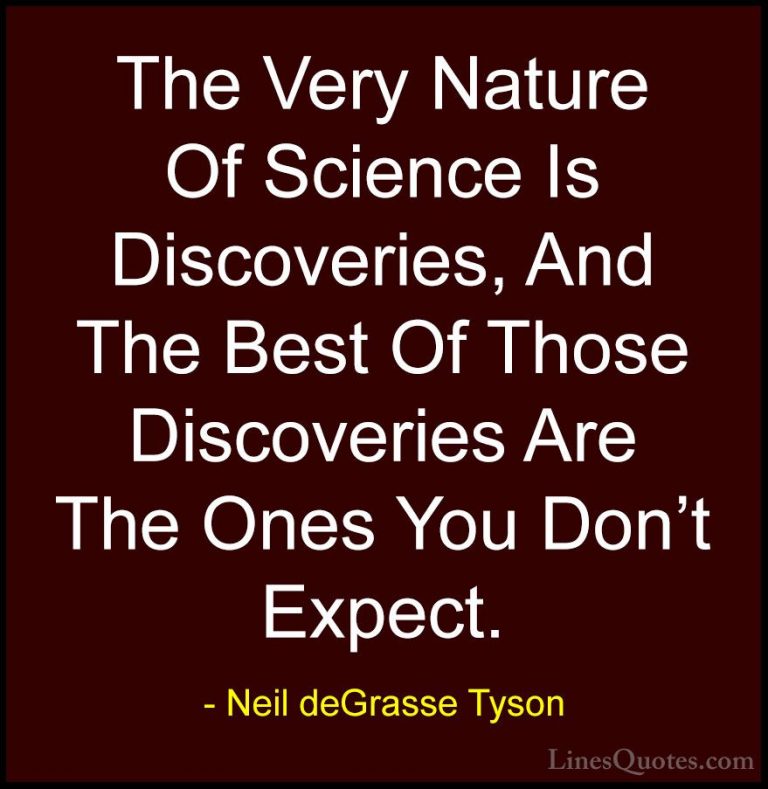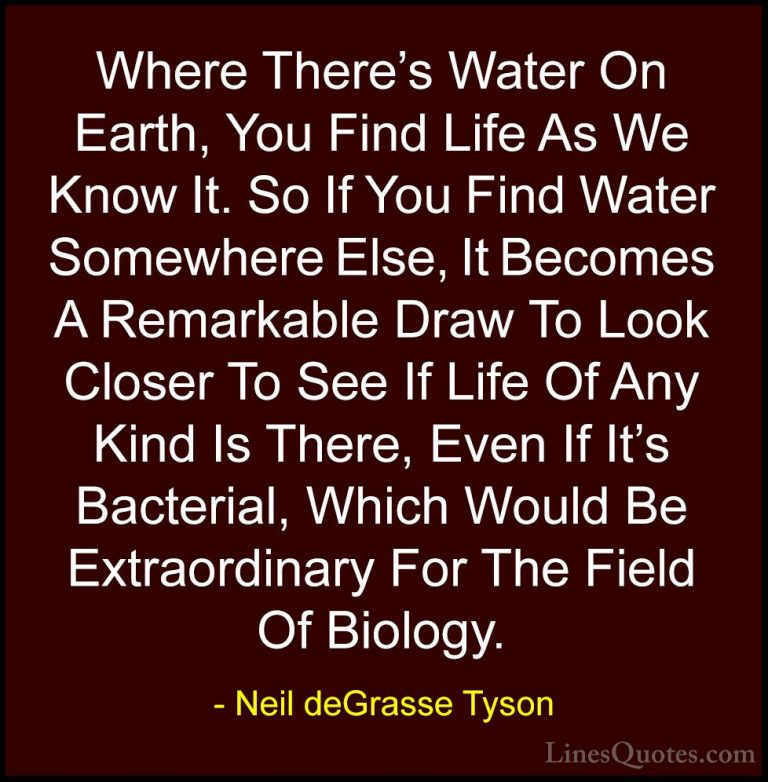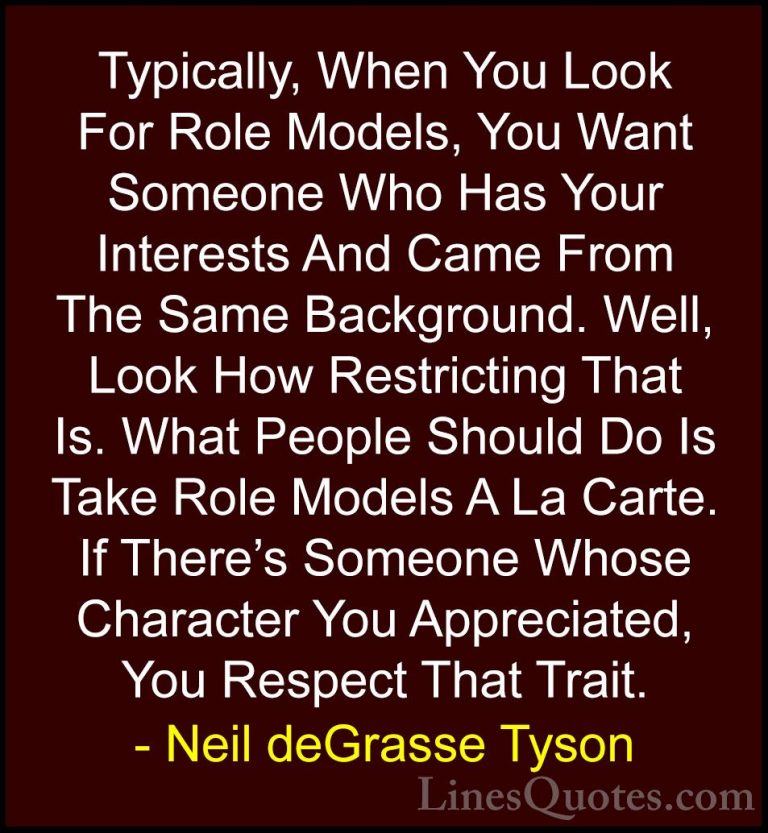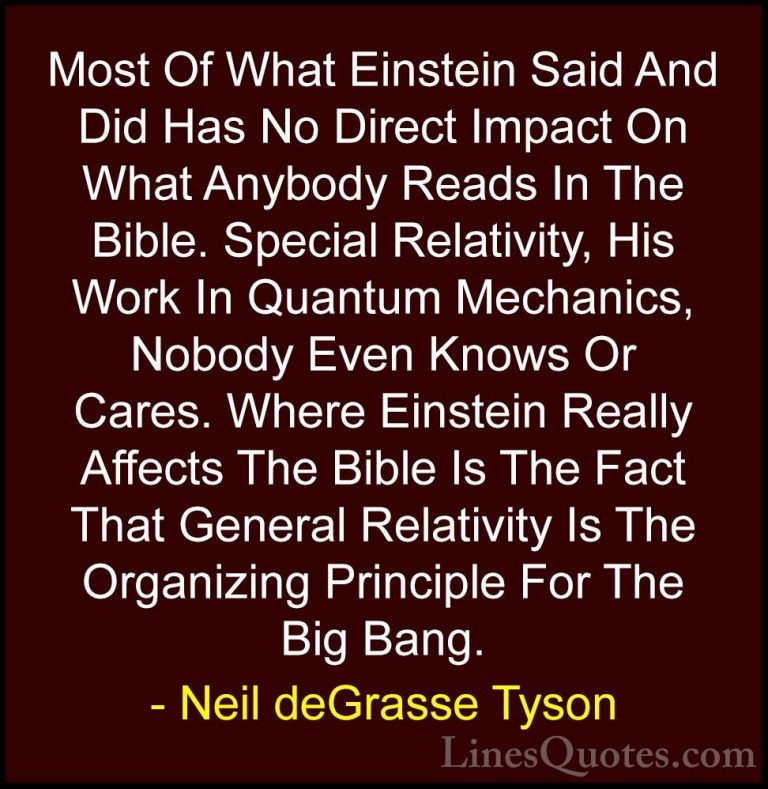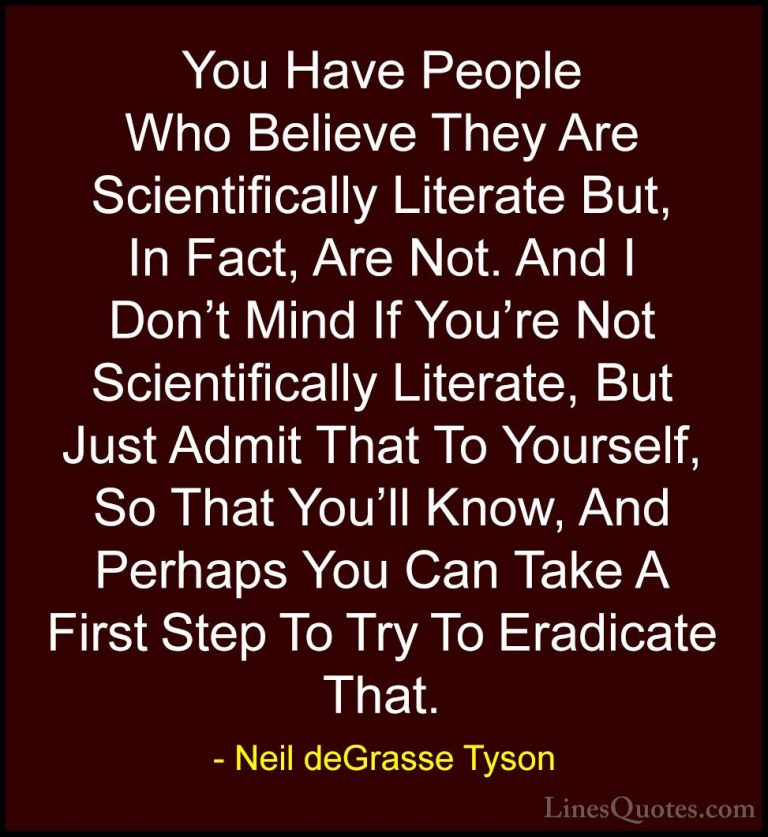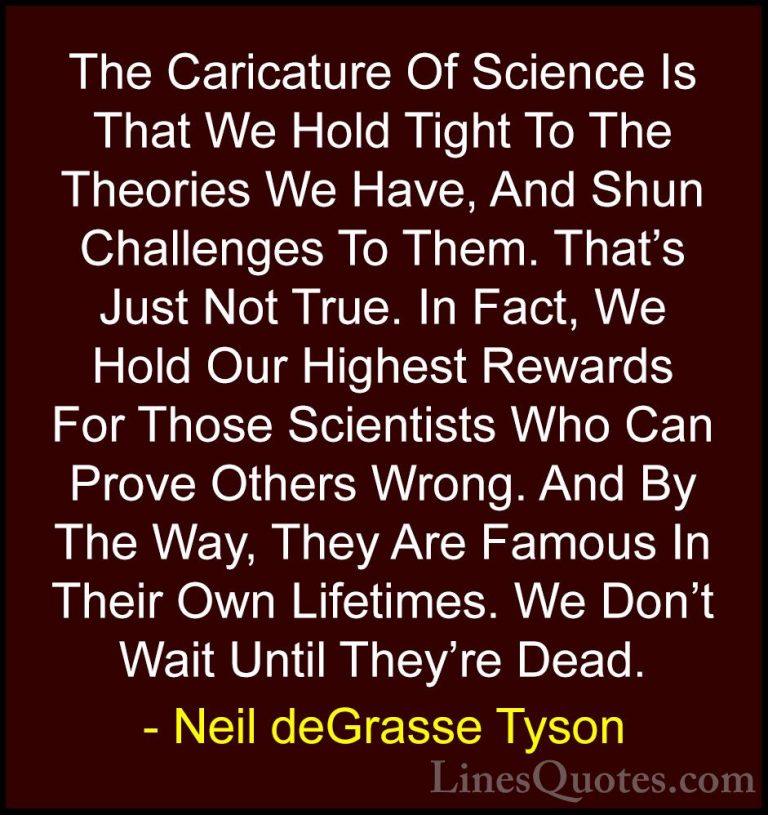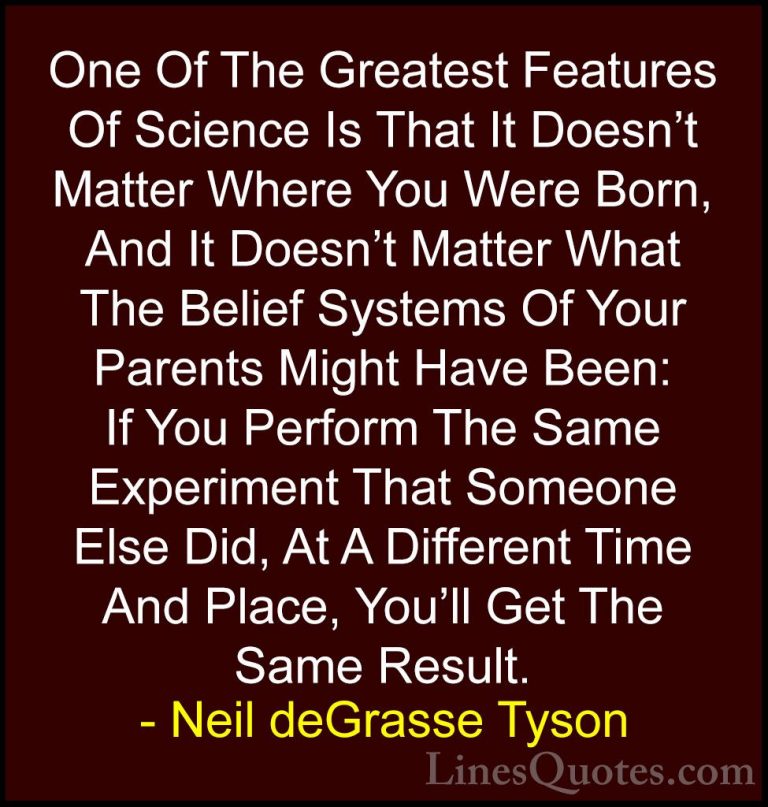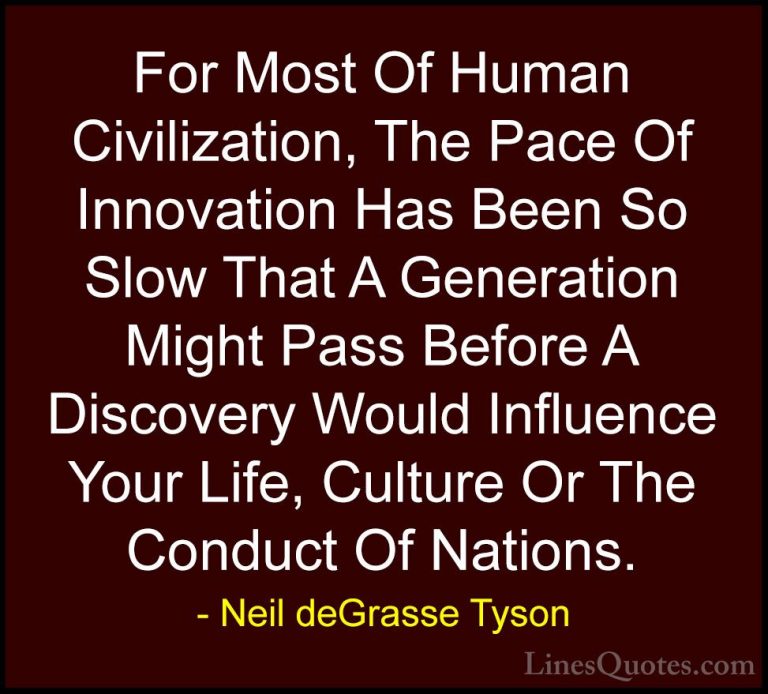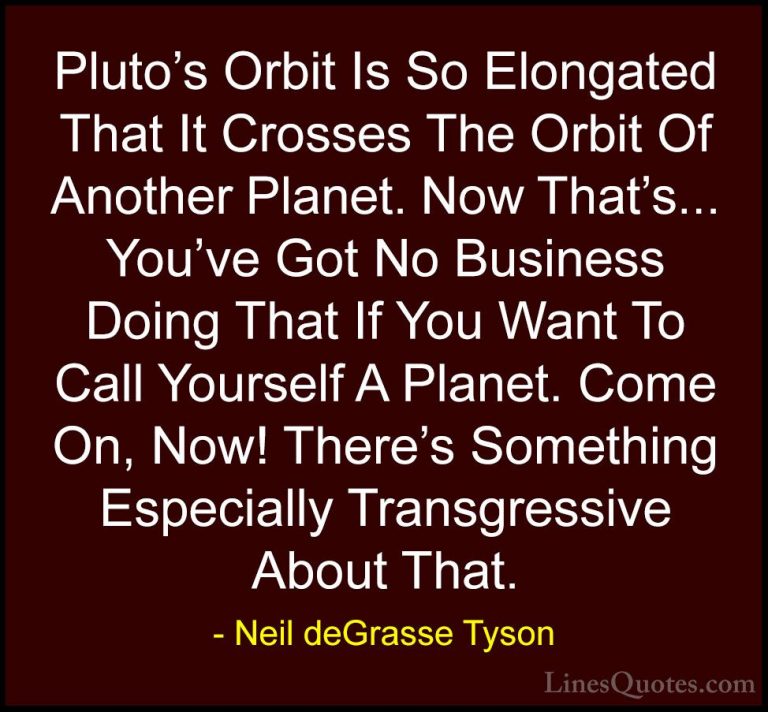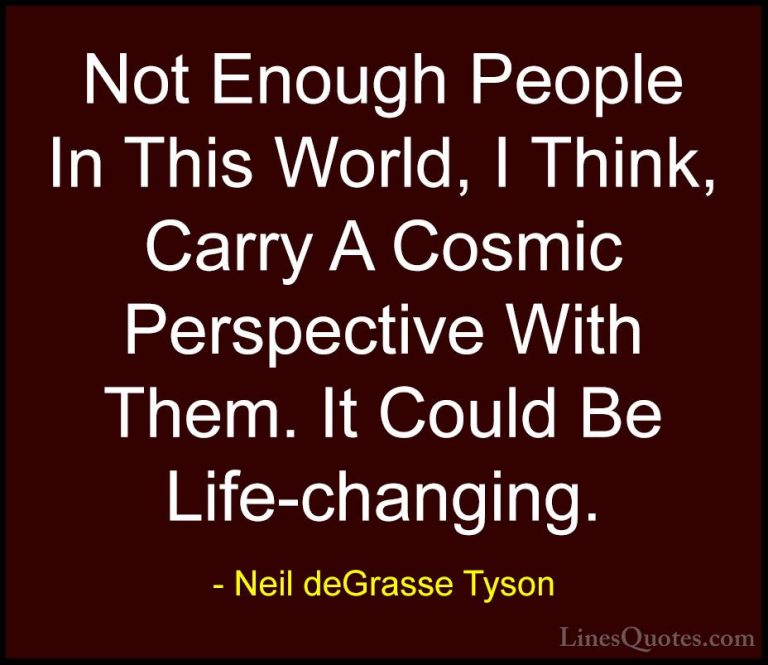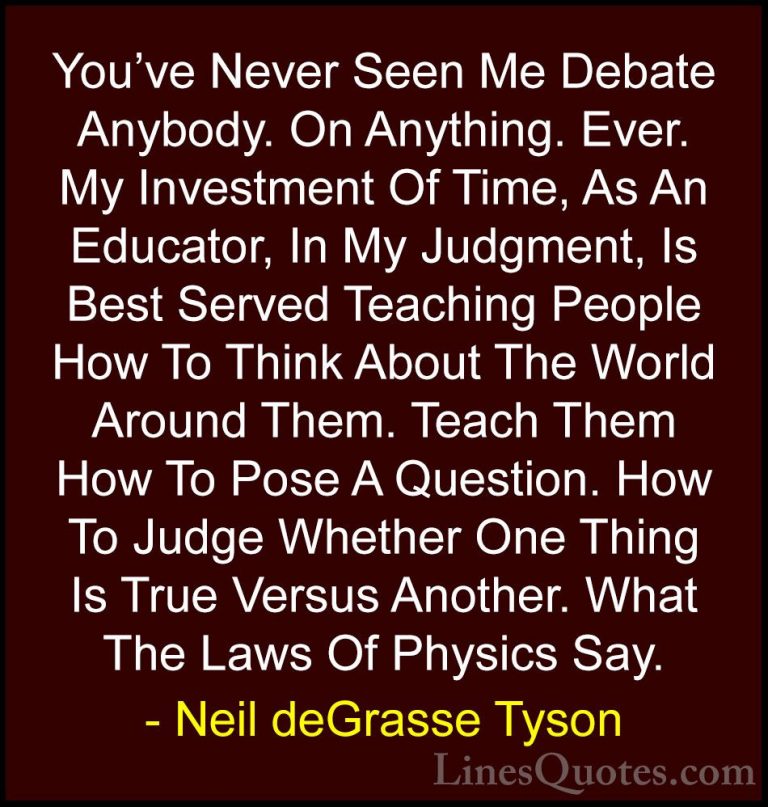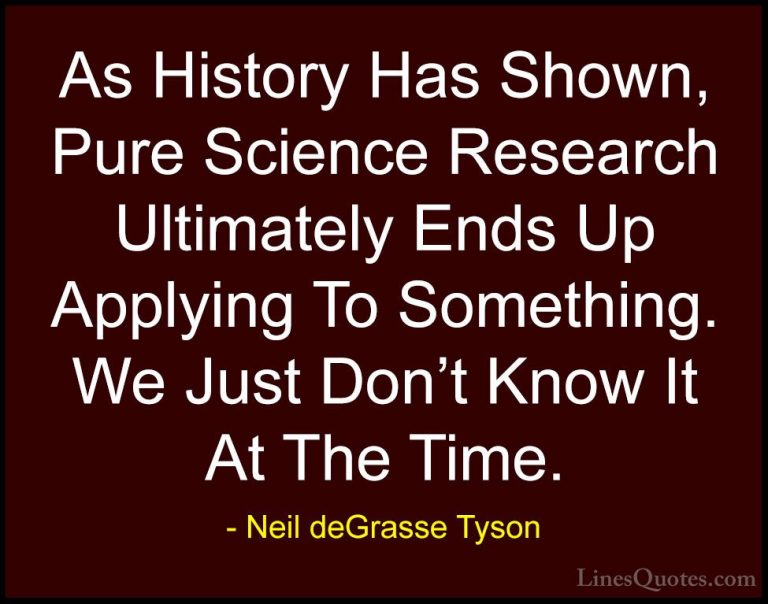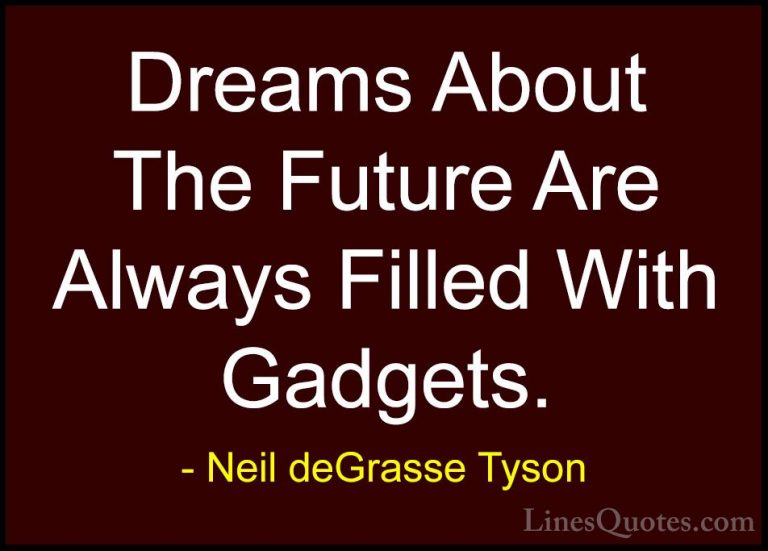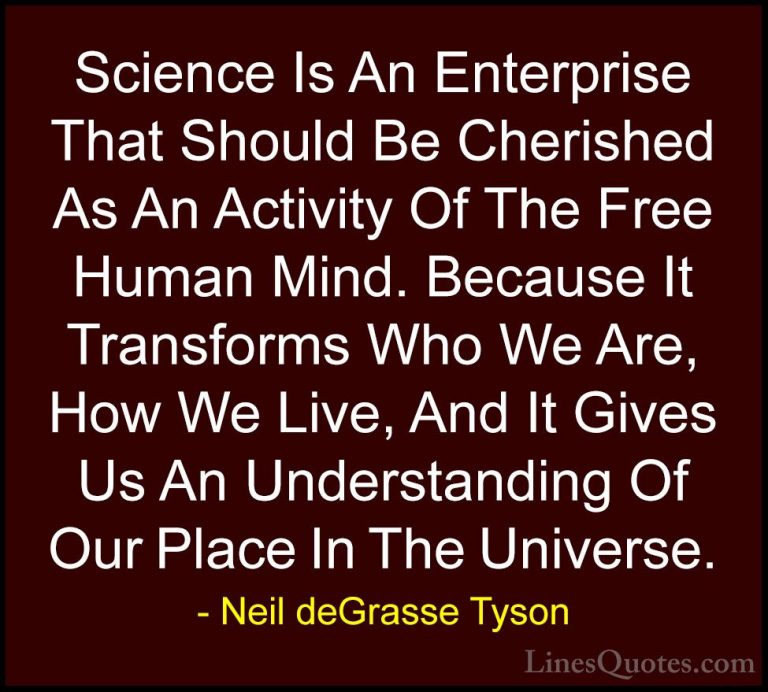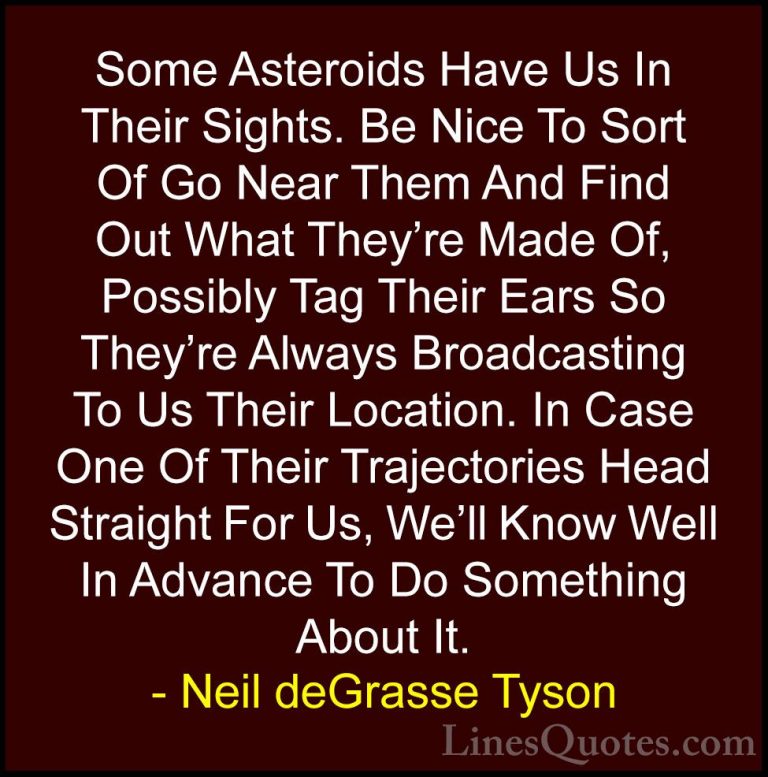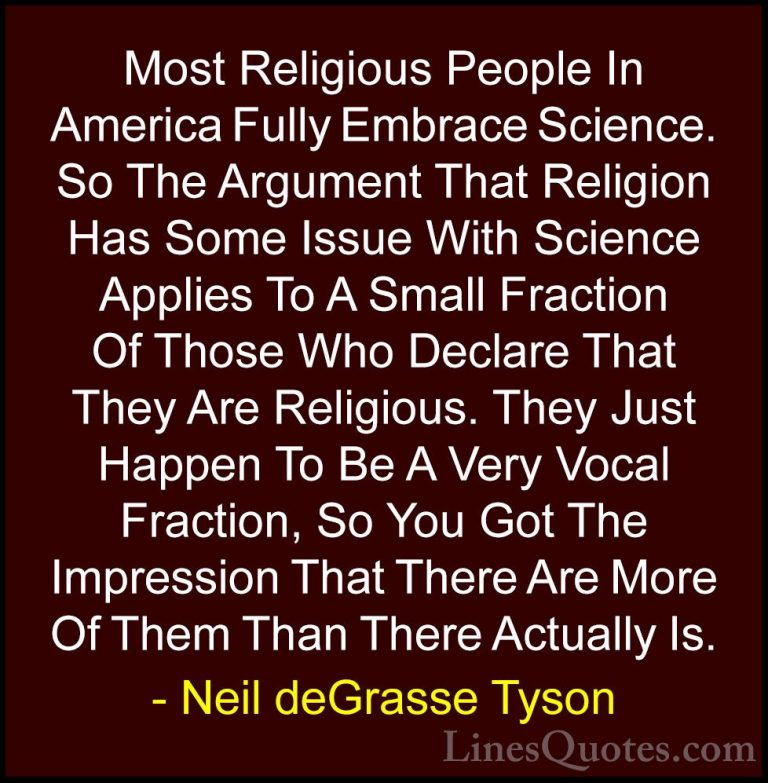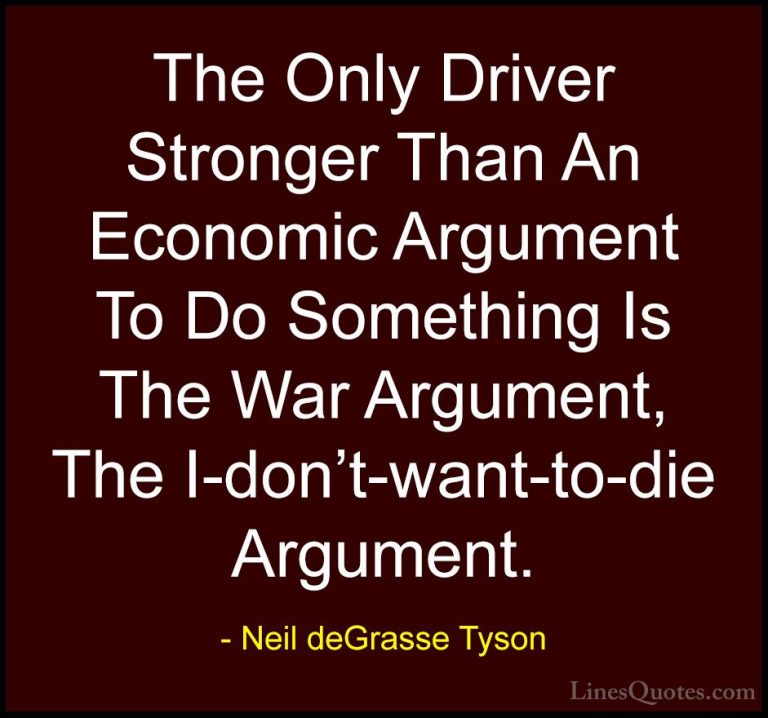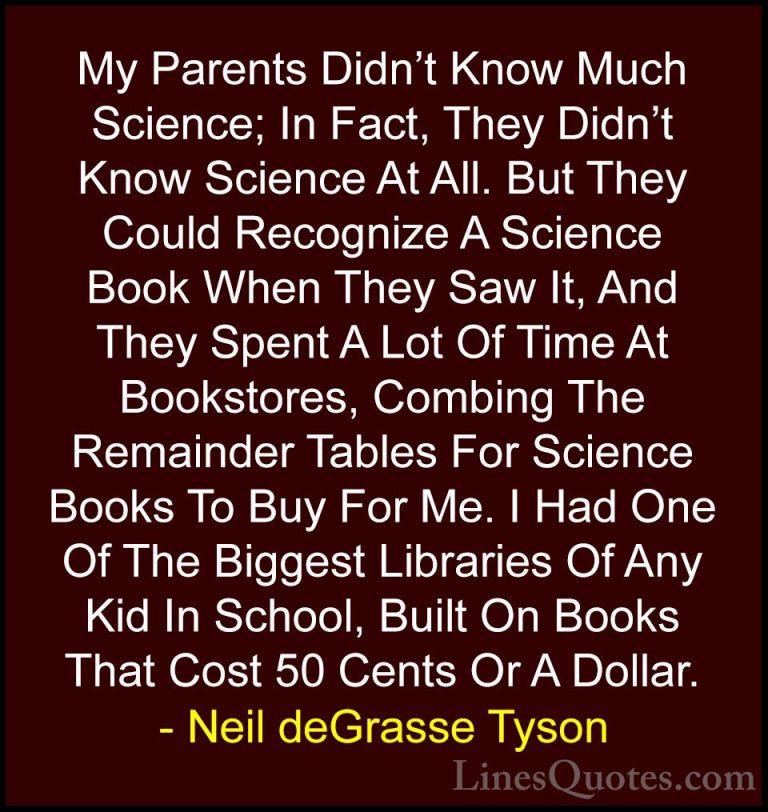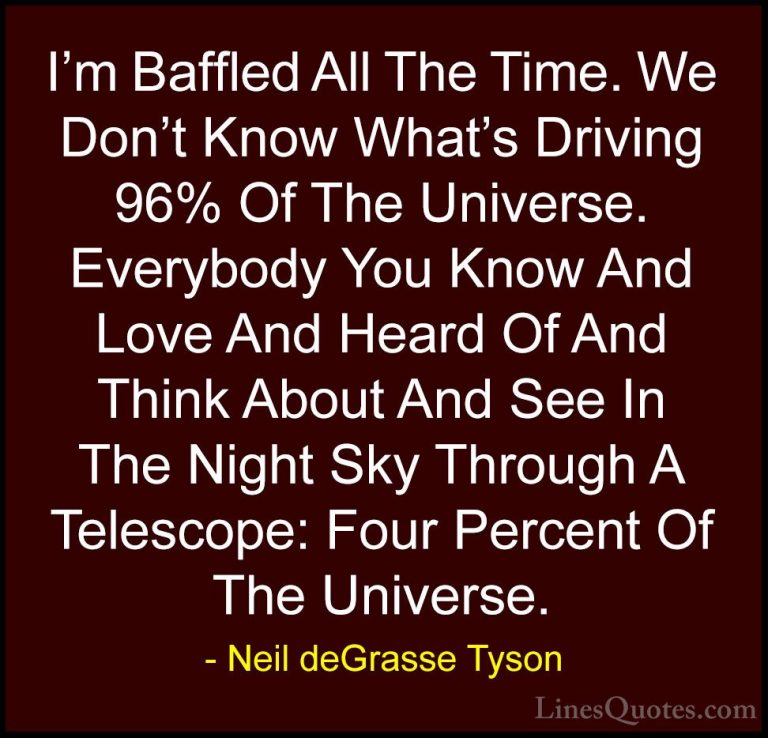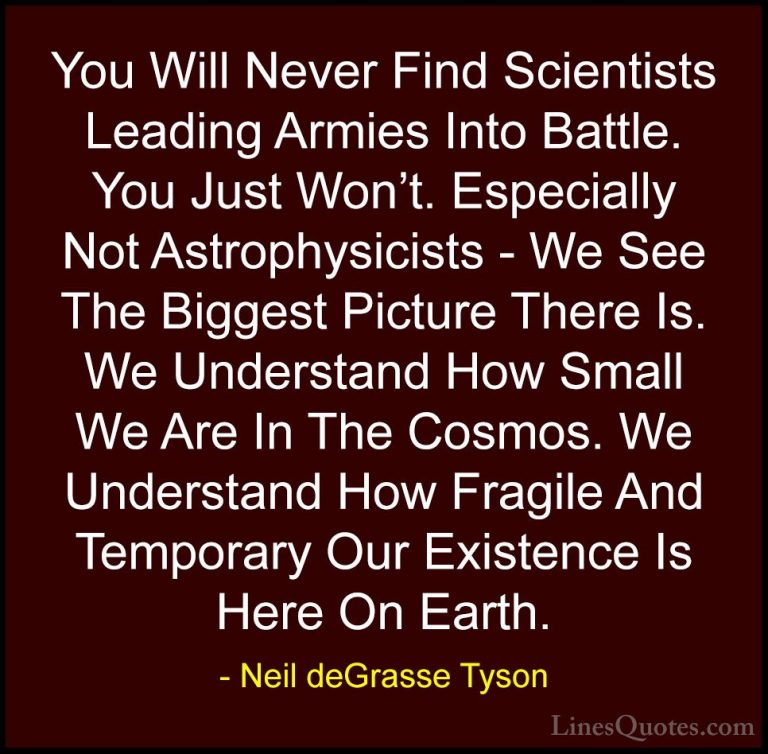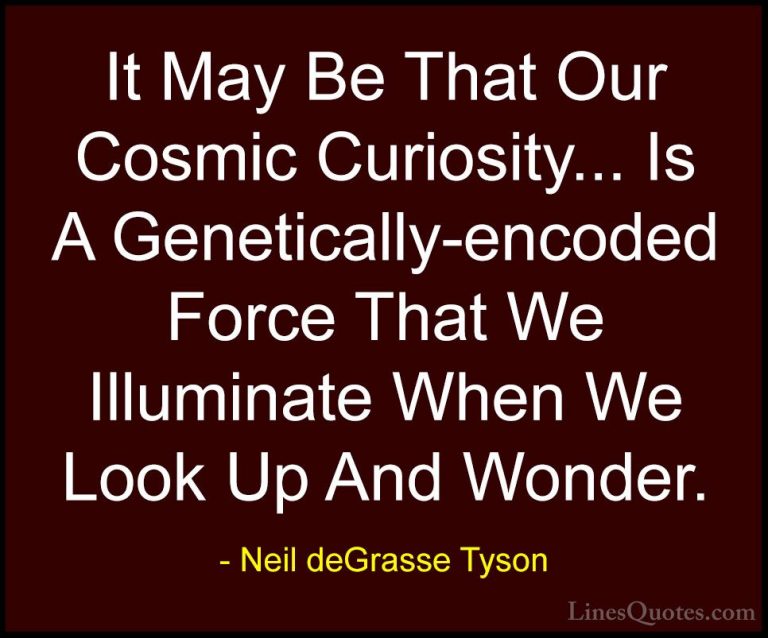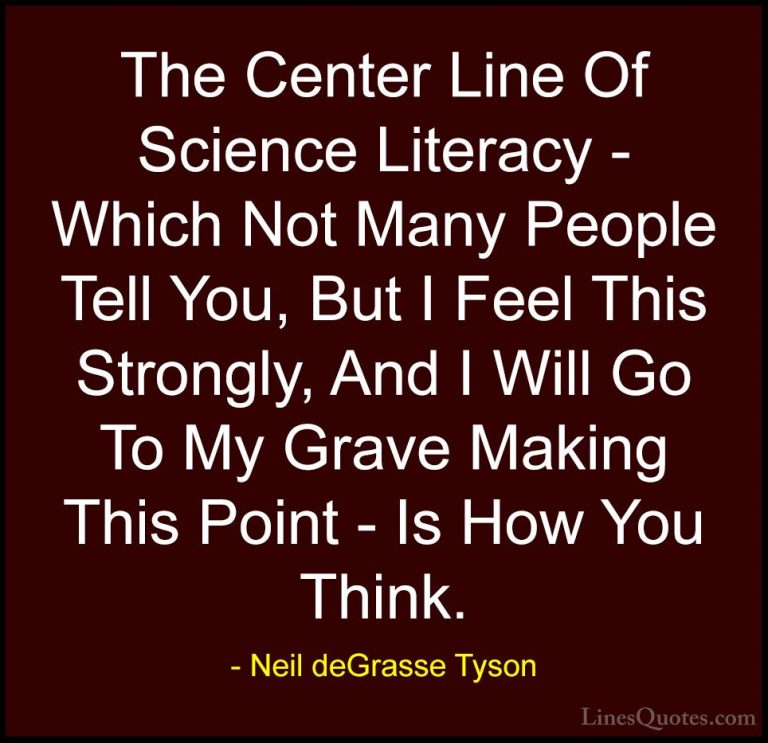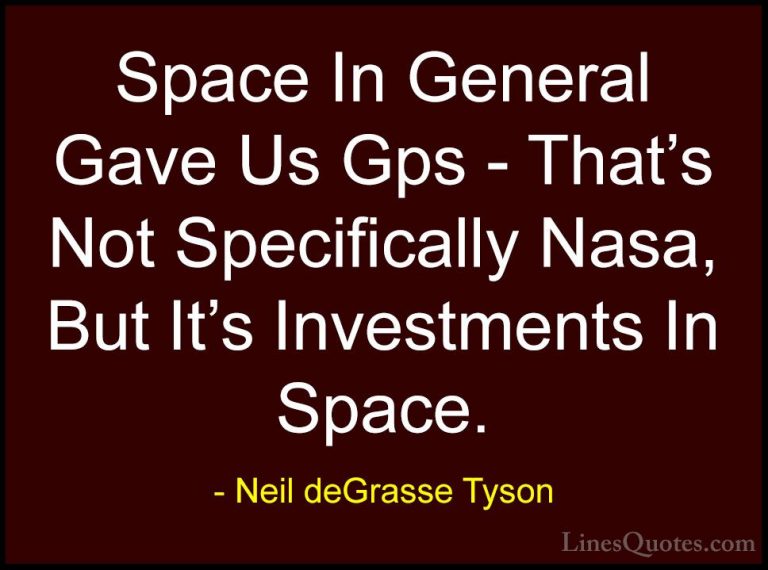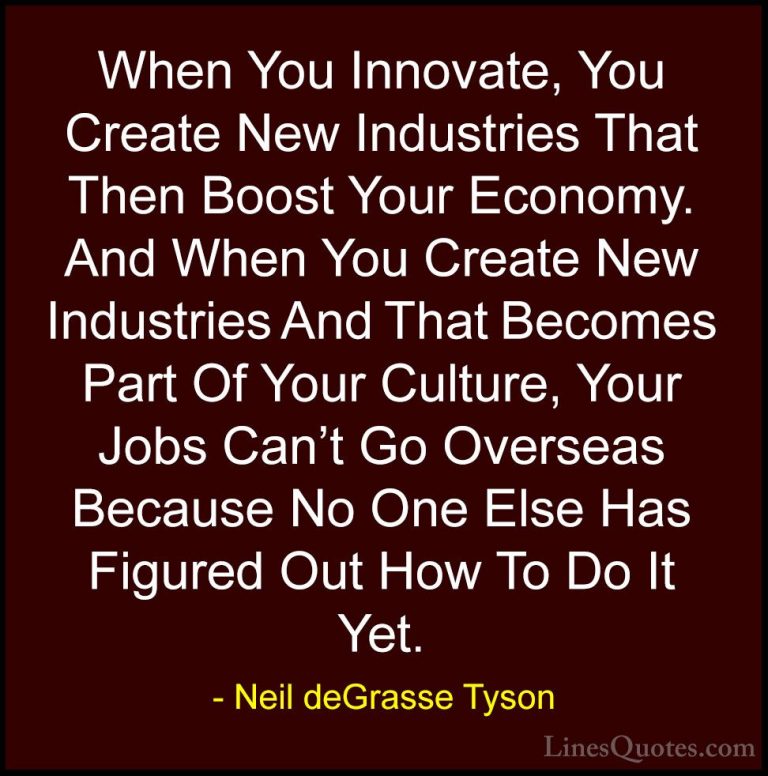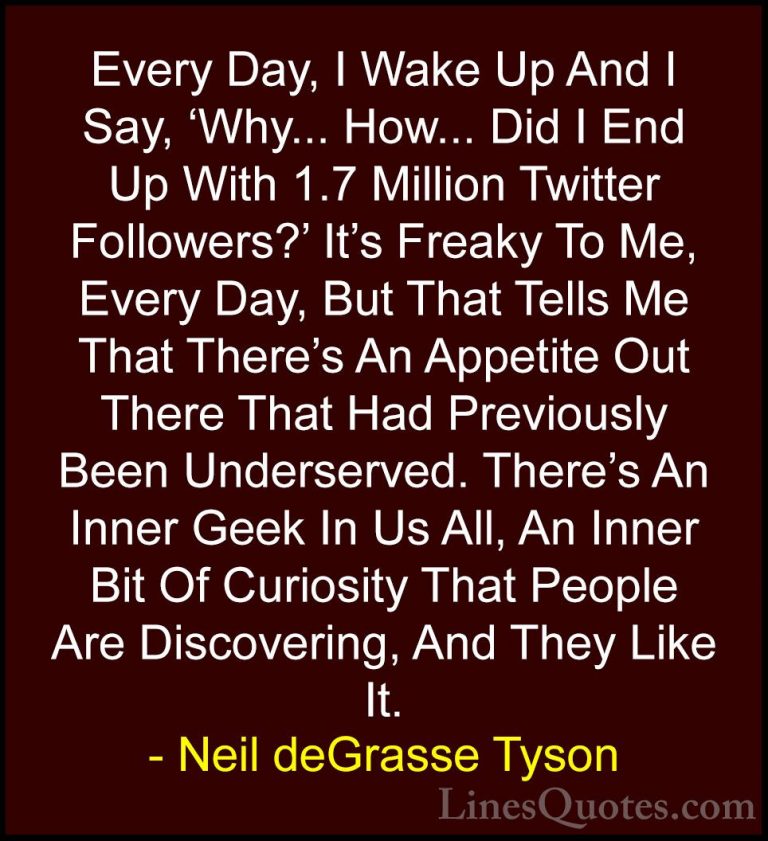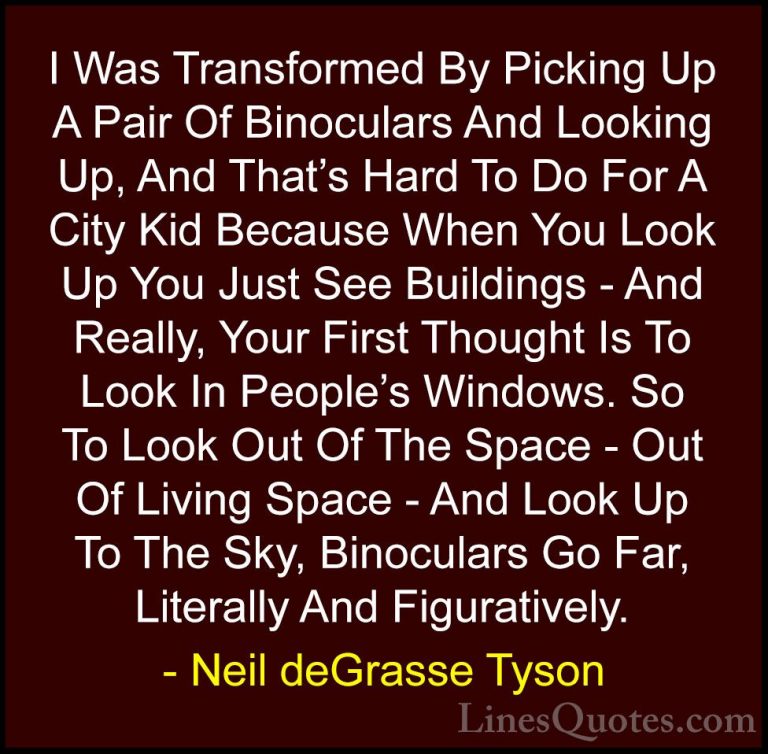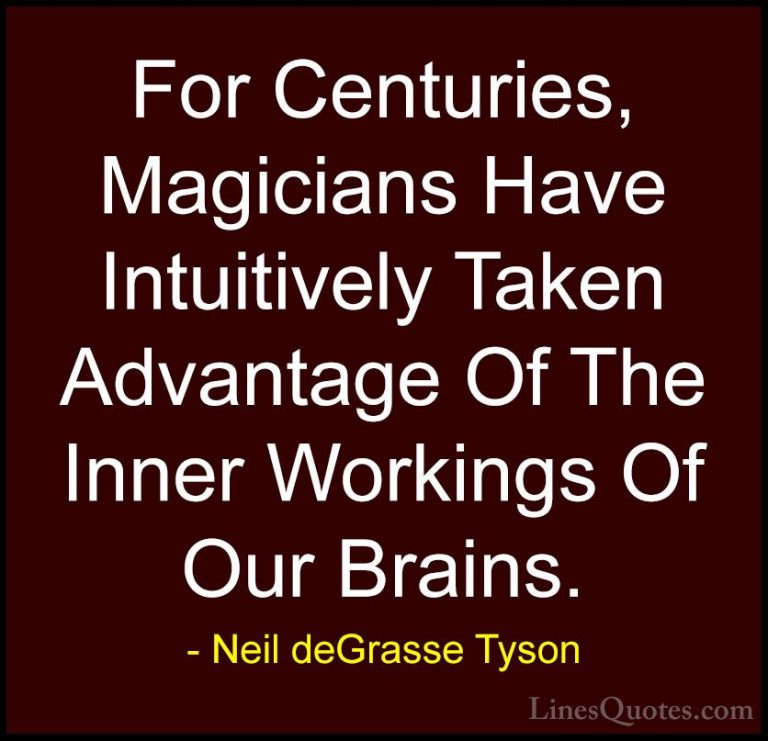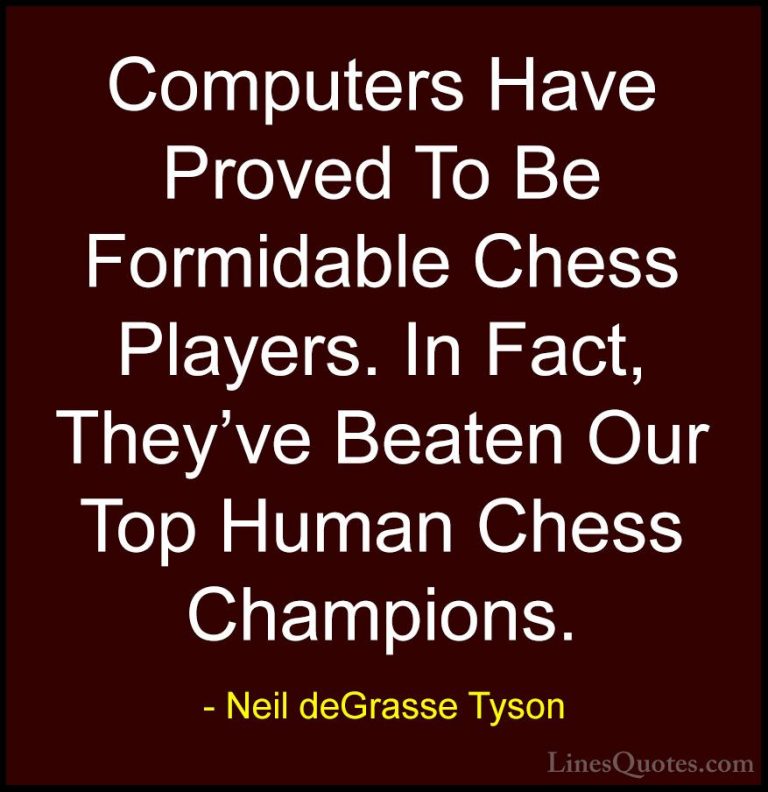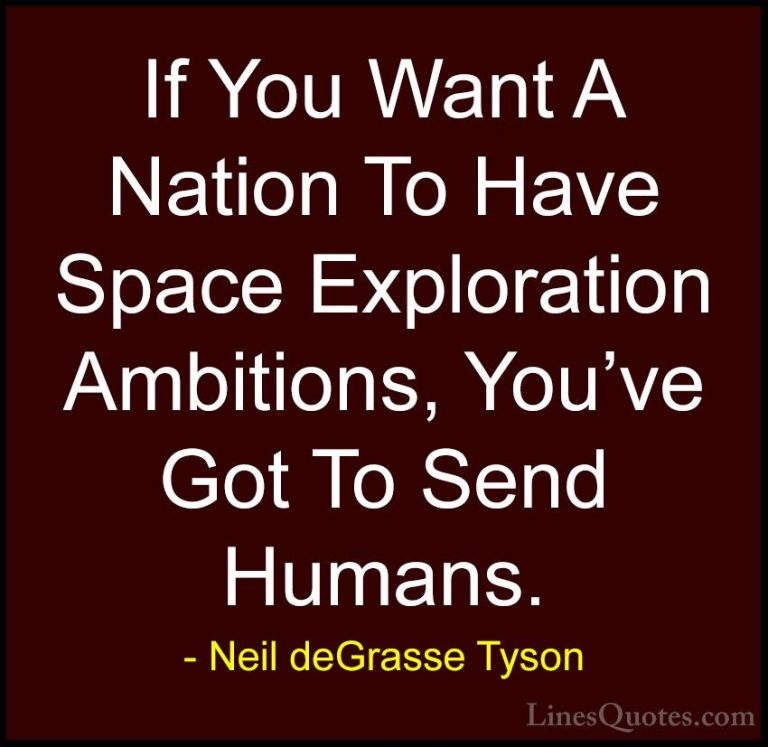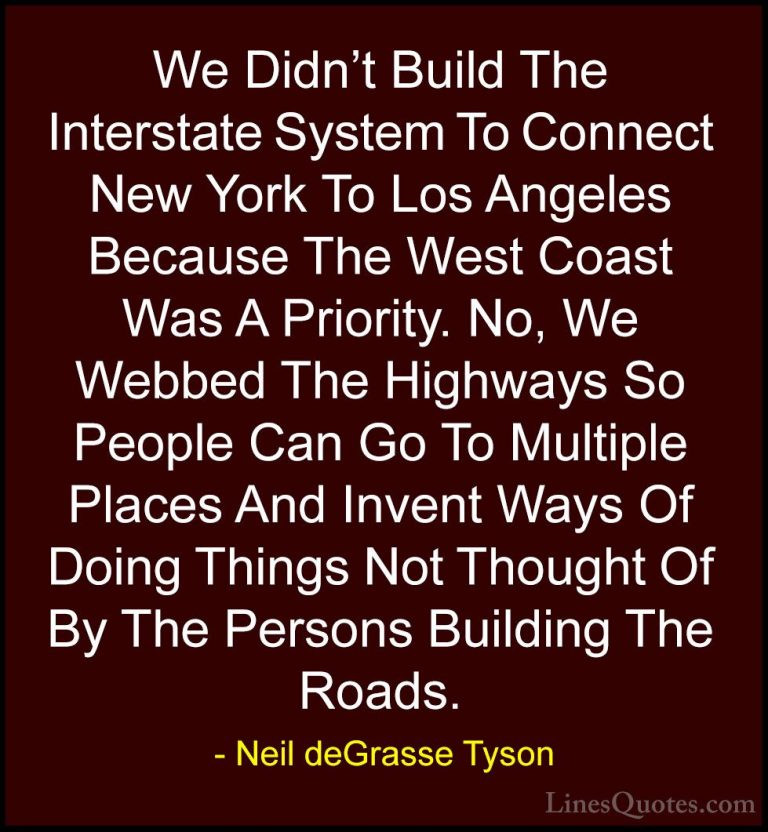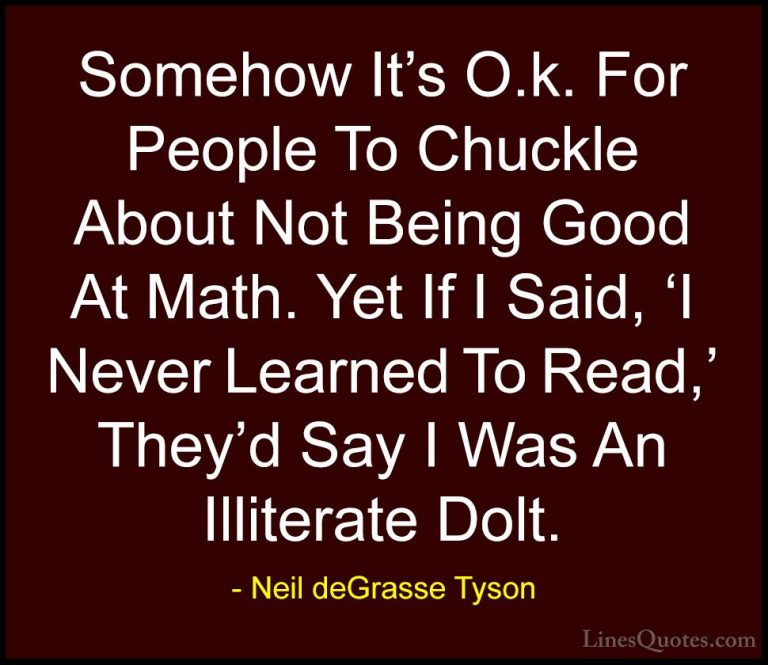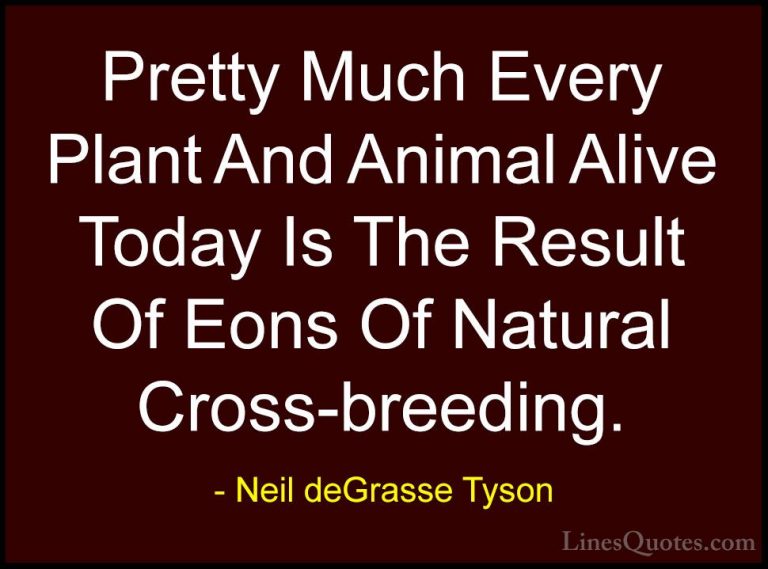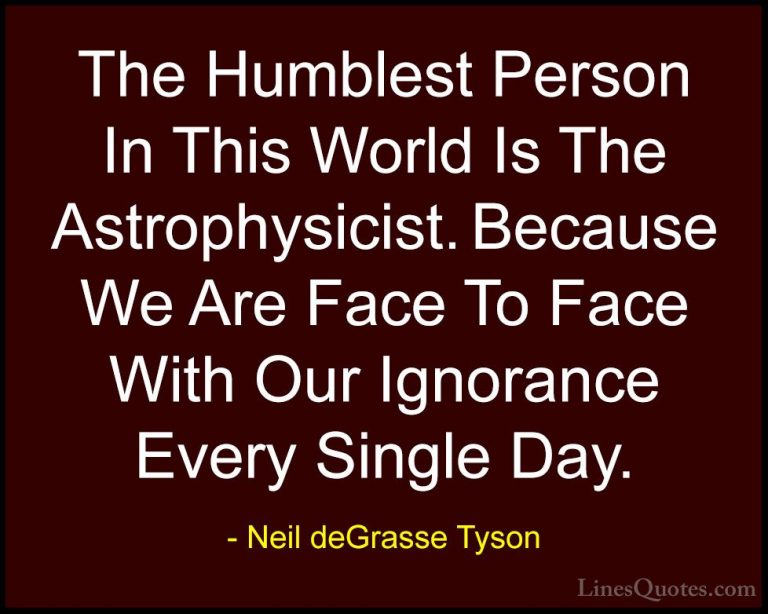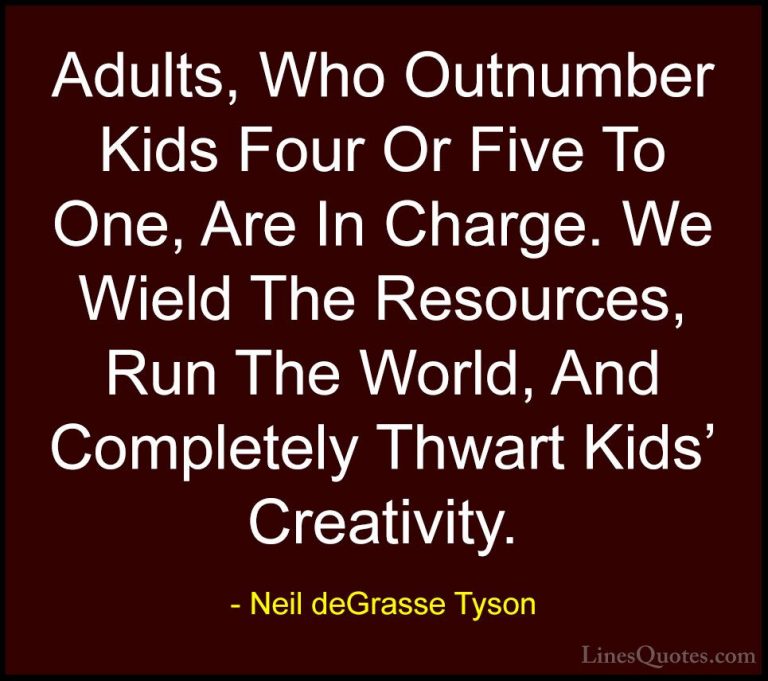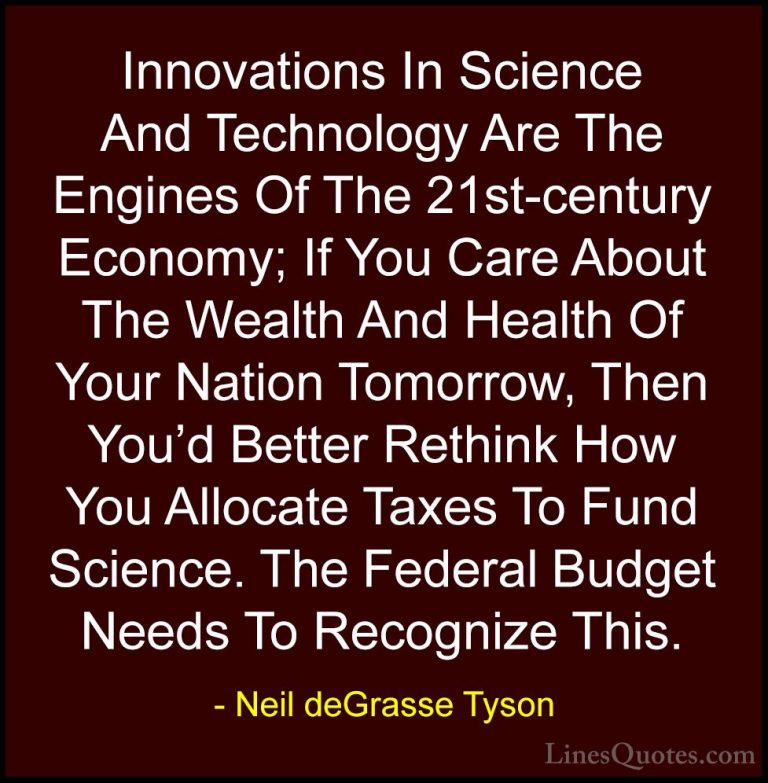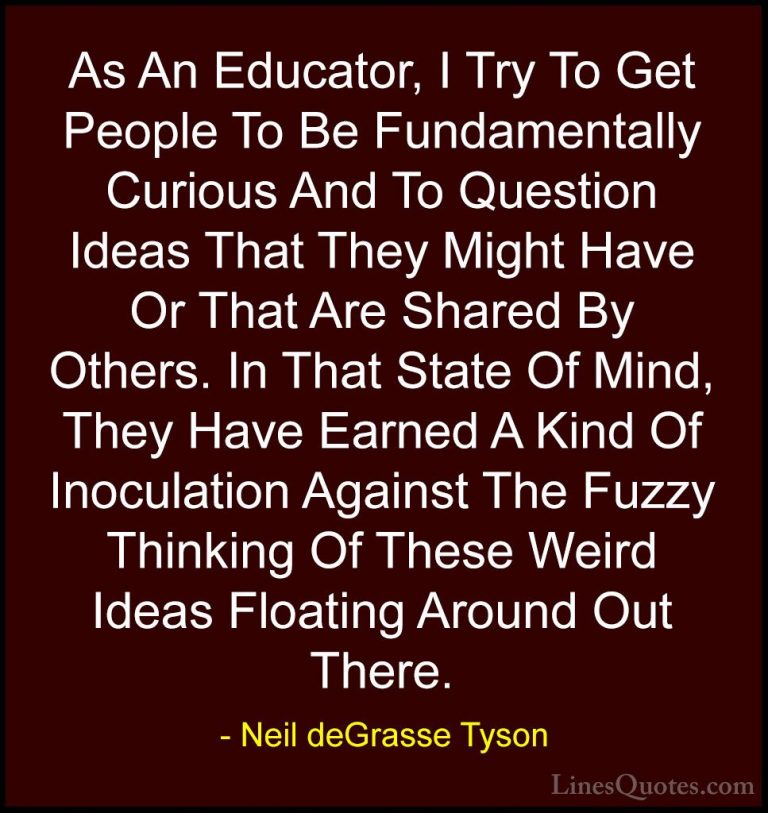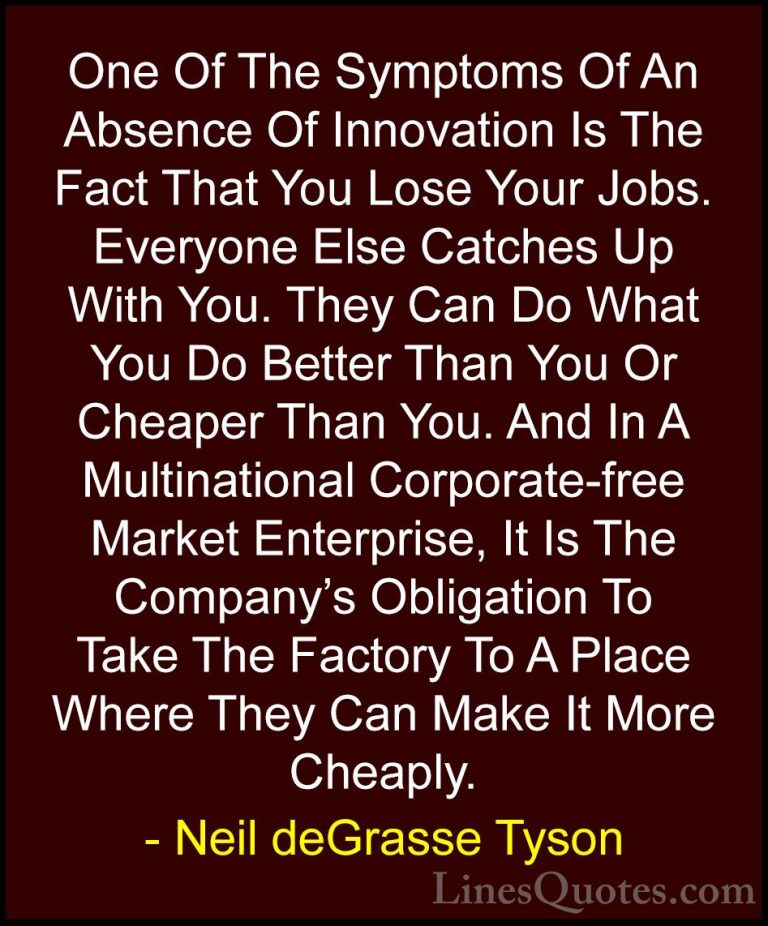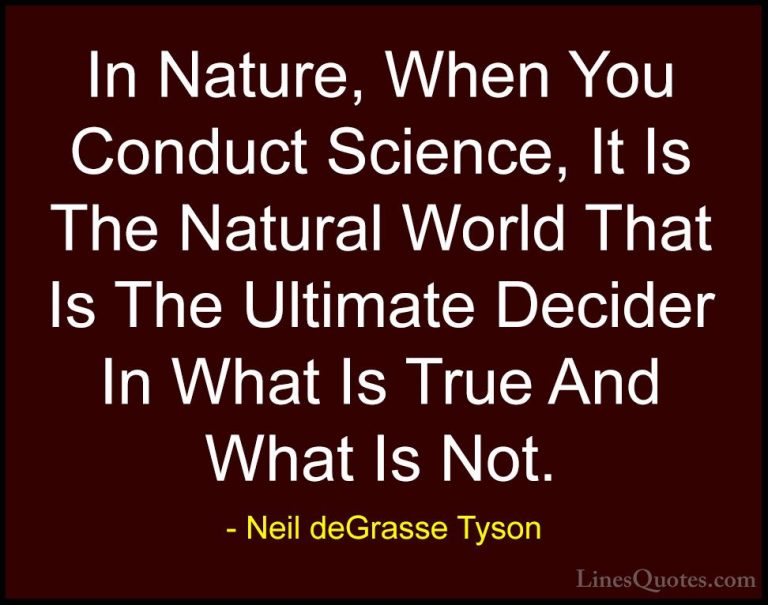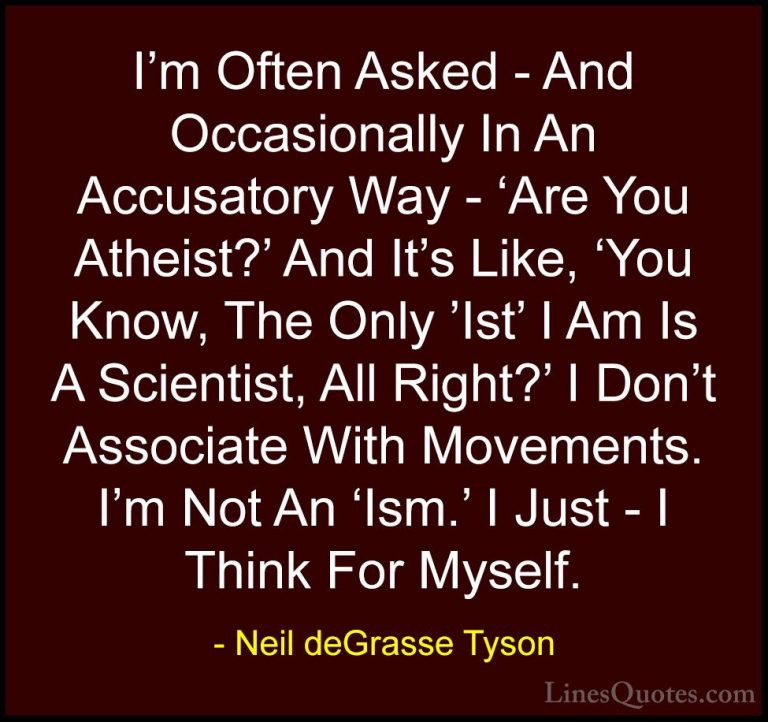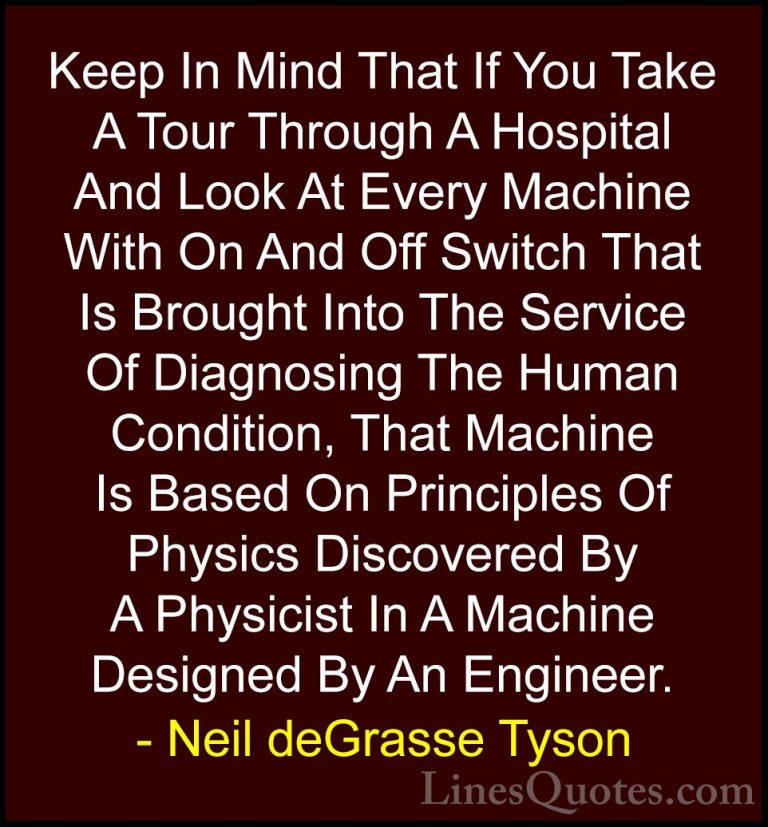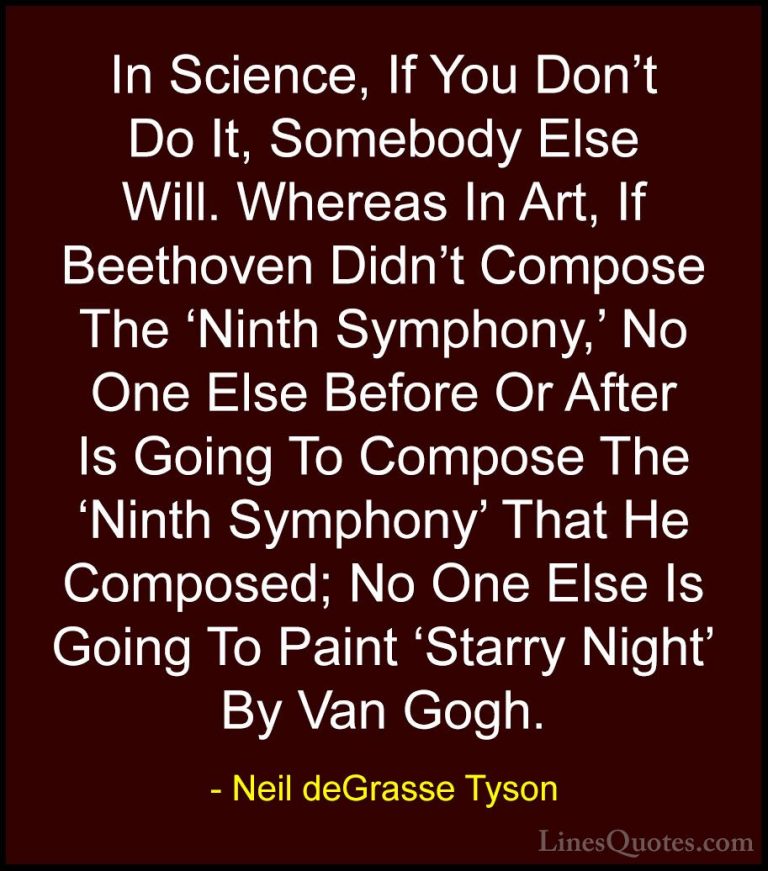Neil deGrasse Tyson is an American astrophysicist, cosmologist, author, and science communicator. Since 1996, he has been the Frederick P. Rose Director of the Hayden Planetarium at the Rose Center for Earth and Space in New York City. Born and raised in New York City, Tyson became interested in astronomy at the age of nine after a visit to the Hayden Planetarium. After receiving a master’s degree in astronomy at the University of Texas at Austin in 1983, he earned his master’s (1989) and doctorate (1991) in astrophysics at Columbia University.
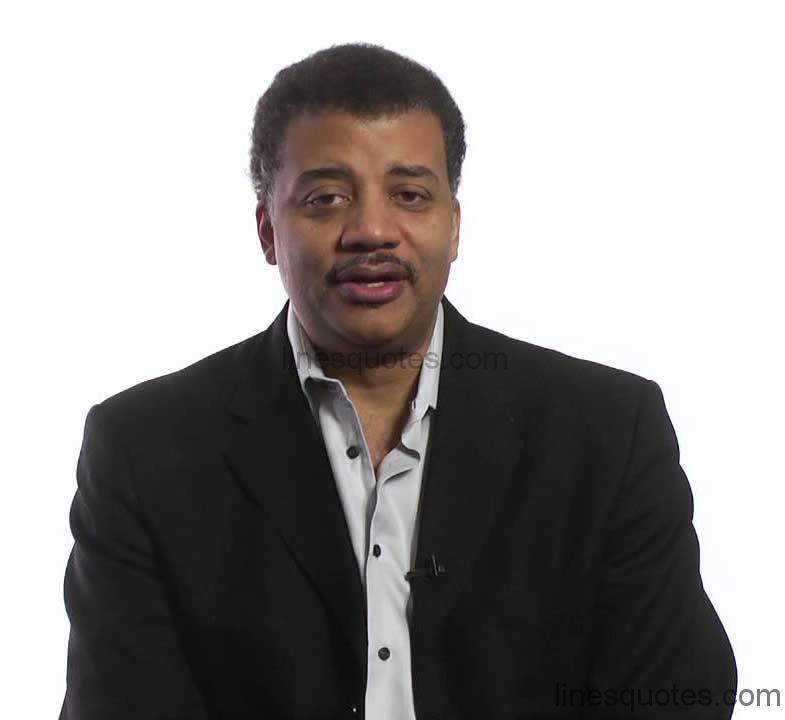
Humans Aren't As Good As We Should Be In Our Capacity To Empathize With Feelings And Thoughts Of Others, Be They Humans Or Other Animals On Earth. So Maybe Part Of Our Formal Education Should Be Training In Empathy. Imagine How Different The World Would Be If, In Fact, That Were 'Reading, Writing, Arithmetic, Empathy.'
We Define Ourselves As Intelligent. That's Odd, Because We're Doing The Definition - We're Creating Our Own Definition And Saying, 'We Are Intelligent!'
I Was An Aspiring Astrophysicist, And That's How I Defined Myself, Not By My Skin Color. People Didn't Treat Me As Someone With Science Ambitions. They Treated Me As Someone They Thought Was Going To Mug Them, Or Who Was A Shoplifter.
Half Of My Library Are Old Books Because I Like Seeing How People Thought About Their World At Their Time. So That I Don't Get Bigheaded About Something We Just Discovered And I Can Be Humble About Where We Might Go Next. Because You Can See Who Got Stuff Right And Most Of The People Who Got Stuff Wrong.
All Tweets Are Tasty. Any Tweet Anybody Writes Is Tasty. So, I Try To Have Each Tweet Not Simply Be Informative, But Have Some Outlook, Some Perspective That You Might Not Otherwise Had.
Kids Are Born Curious About The World. What Adults Primarily Do In The Presence Of Kids Is Unwittingly Thwart The Curiosity Of Children.
One Of The Things That Fascinates Me Most Is When People Are So Charmed By The Universe That It Becomes Part Of Their Artistic Output.
Asteroids Have Us In Our Sight. The Dinosaurs Didn't Have A Space Program, So They're Not Here To Talk About This Problem. We Are, And We Have The Power To Do Something About It. I Don't Want To Be The Embarrassment Of The Galaxy, To Have Had The Power To Deflect An Asteroid, And Then Not, And End Up Going Extinct.
The First Colony On Mars Is Not Going To Be Built By A Private Company. How Are You Going To Make Money? You're Not.
The Very Nature Of Science Is Discoveries, And The Best Of Those Discoveries Are The Ones You Don't Expect.
Where There's Water On Earth, You Find Life As We Know It. So If You Find Water Somewhere Else, It Becomes A Remarkable Draw To Look Closer To See If Life Of Any Kind Is There, Even If It's Bacterial, Which Would Be Extraordinary For The Field Of Biology.
Typically, When You Look For Role Models, You Want Someone Who Has Your Interests And Came From The Same Background. Well, Look How Restricting That Is. What People Should Do Is Take Role Models A La Carte. If There's Someone Whose Character You Appreciated, You Respect That Trait.
Most Of What Einstein Said And Did Has No Direct Impact On What Anybody Reads In The Bible. Special Relativity, His Work In Quantum Mechanics, Nobody Even Knows Or Cares. Where Einstein Really Affects The Bible Is The Fact That General Relativity Is The Organizing Principle For The Big Bang.
You Have People Who Believe They Are Scientifically Literate But, In Fact, Are Not. And I Don't Mind If You're Not Scientifically Literate, But Just Admit That To Yourself, So That You'll Know, And Perhaps You Can Take A First Step To Try To Eradicate That.
The Caricature Of Science Is That We Hold Tight To The Theories We Have, And Shun Challenges To Them. That's Just Not True. In Fact, We Hold Our Highest Rewards For Those Scientists Who Can Prove Others Wrong. And By The Way, They Are Famous In Their Own Lifetimes. We Don't Wait Until They're Dead.
One Of The Greatest Features Of Science Is That It Doesn't Matter Where You Were Born, And It Doesn't Matter What The Belief Systems Of Your Parents Might Have Been: If You Perform The Same Experiment That Someone Else Did, At A Different Time And Place, You'll Get The Same Result.
For Most Of Human Civilization, The Pace Of Innovation Has Been So Slow That A Generation Might Pass Before A Discovery Would Influence Your Life, Culture Or The Conduct Of Nations.
Pluto's Orbit Is So Elongated That It Crosses The Orbit Of Another Planet. Now That's... You've Got No Business Doing That If You Want To Call Yourself A Planet. Come On, Now! There's Something Especially Transgressive About That.
Not Enough People In This World, I Think, Carry A Cosmic Perspective With Them. It Could Be Life-changing.
You've Never Seen Me Debate Anybody. On Anything. Ever. My Investment Of Time, As An Educator, In My Judgment, Is Best Served Teaching People How To Think About The World Around Them. Teach Them How To Pose A Question. How To Judge Whether One Thing Is True Versus Another. What The Laws Of Physics Say.
As History Has Shown, Pure Science Research Ultimately Ends Up Applying To Something. We Just Don't Know It At The Time.
Dreams About The Future Are Always Filled With Gadgets.
Science Is An Enterprise That Should Be Cherished As An Activity Of The Free Human Mind. Because It Transforms Who We Are, How We Live, And It Gives Us An Understanding Of Our Place In The Universe.
Some Asteroids Have Us In Their Sights. Be Nice To Sort Of Go Near Them And Find Out What They're Made Of, Possibly Tag Their Ears So They're Always Broadcasting To Us Their Location. In Case One Of Their Trajectories Head Straight For Us, We'll Know Well In Advance To Do Something About It.
Most Religious People In America Fully Embrace Science. So The Argument That Religion Has Some Issue With Science Applies To A Small Fraction Of Those Who Declare That They Are Religious. They Just Happen To Be A Very Vocal Fraction, So You Got The Impression That There Are More Of Them Than There Actually Is.
The Only Driver Stronger Than An Economic Argument To Do Something Is The War Argument, The I-don't-want-to-die Argument.
My Parents Didn't Know Much Science; In Fact, They Didn't Know Science At All. But They Could Recognize A Science Book When They Saw It, And They Spent A Lot Of Time At Bookstores, Combing The Remainder Tables For Science Books To Buy For Me. I Had One Of The Biggest Libraries Of Any Kid In School, Built On Books That Cost 50 Cents Or A Dollar.
I'm Baffled All The Time. We Don't Know What's Driving 96% Of The Universe. Everybody You Know And Love And Heard Of And Think About And See In The Night Sky Through A Telescope: Four Percent Of The Universe.
You Will Never Find Scientists Leading Armies Into Battle. You Just Won't. Especially Not Astrophysicists - We See The Biggest Picture There Is. We Understand How Small We Are In The Cosmos. We Understand How Fragile And Temporary Our Existence Is Here On Earth.
It May Be That Our Cosmic Curiosity... Is A Genetically-encoded Force That We Illuminate When We Look Up And Wonder.
The Center Line Of Science Literacy - Which Not Many People Tell You, But I Feel This Strongly, And I Will Go To My Grave Making This Point - Is How You Think.
Space In General Gave Us Gps - That's Not Specifically Nasa, But It's Investments In Space.
When You Innovate, You Create New Industries That Then Boost Your Economy. And When You Create New Industries And That Becomes Part Of Your Culture, Your Jobs Can't Go Overseas Because No One Else Has Figured Out How To Do It Yet.
Every Day, I Wake Up And I Say, 'Why... How... Did I End Up With 1.7 Million Twitter Followers?' It's Freaky To Me, Every Day, But That Tells Me That There's An Appetite Out There That Had Previously Been Underserved. There's An Inner Geek In Us All, An Inner Bit Of Curiosity That People Are Discovering, And They Like It.
I Was Transformed By Picking Up A Pair Of Binoculars And Looking Up, And That's Hard To Do For A City Kid Because When You Look Up You Just See Buildings - And Really, Your First Thought Is To Look In People's Windows. So To Look Out Of The Space - Out Of Living Space - And Look Up To The Sky, Binoculars Go Far, Literally And Figuratively.
For Centuries, Magicians Have Intuitively Taken Advantage Of The Inner Workings Of Our Brains.
Computers Have Proved To Be Formidable Chess Players. In Fact, They've Beaten Our Top Human Chess Champions.
If You Want A Nation To Have Space Exploration Ambitions, You've Got To Send Humans.
We Didn't Build The Interstate System To Connect New York To Los Angeles Because The West Coast Was A Priority. No, We Webbed The Highways So People Can Go To Multiple Places And Invent Ways Of Doing Things Not Thought Of By The Persons Building The Roads.
Somehow It's O.k. For People To Chuckle About Not Being Good At Math. Yet If I Said, 'I Never Learned To Read,' They'd Say I Was An Illiterate Dolt.
Pretty Much Every Plant And Animal Alive Today Is The Result Of Eons Of Natural Cross-breeding.
The Humblest Person In This World Is The Astrophysicist. Because We Are Face To Face With Our Ignorance Every Single Day.
Adults, Who Outnumber Kids Four Or Five To One, Are In Charge. We Wield The Resources, Run The World, And Completely Thwart Kids' Creativity.
Innovations In Science And Technology Are The Engines Of The 21st-century Economy; If You Care About The Wealth And Health Of Your Nation Tomorrow, Then You'd Better Rethink How You Allocate Taxes To Fund Science. The Federal Budget Needs To Recognize This.
As An Educator, I Try To Get People To Be Fundamentally Curious And To Question Ideas That They Might Have Or That Are Shared By Others. In That State Of Mind, They Have Earned A Kind Of Inoculation Against The Fuzzy Thinking Of These Weird Ideas Floating Around Out There.
One Of The Symptoms Of An Absence Of Innovation Is The Fact That You Lose Your Jobs. Everyone Else Catches Up With You. They Can Do What You Do Better Than You Or Cheaper Than You. And In A Multinational Corporate-free Market Enterprise, It Is The Company's Obligation To Take The Factory To A Place Where They Can Make It More Cheaply.
In Nature, When You Conduct Science, It Is The Natural World That Is The Ultimate Decider In What Is True And What Is Not.
I'm Often Asked - And Occasionally In An Accusatory Way - 'Are You Atheist?' And It's Like, 'You Know, The Only 'Ist' I Am Is A Scientist, All Right?' I Don't Associate With Movements. I'm Not An 'Ism.' I Just - I Think For Myself.
Keep In Mind That If You Take A Tour Through A Hospital And Look At Every Machine With On And Off Switch That Is Brought Into The Service Of Diagnosing The Human Condition, That Machine Is Based On Principles Of Physics Discovered By A Physicist In A Machine Designed By An Engineer.
In Science, If You Don't Do It, Somebody Else Will. Whereas In Art, If Beethoven Didn't Compose The 'Ninth Symphony,' No One Else Before Or After Is Going To Compose The 'Ninth Symphony' That He Composed; No One Else Is Going To Paint 'Starry Night' By Van Gogh.
